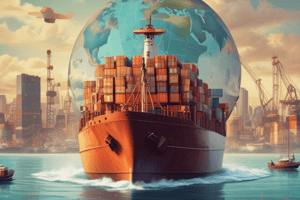Podcast
Questions and Answers
What is the primary reason some countries are against free trade?
What is the primary reason some countries are against free trade?
- Desire to maintain domestic employment (correct)
- Concern for increases in import quality
- Fear of losing international markets
- The belief that imports are less expensive
What does protectionism aim to achieve?
What does protectionism aim to achieve?
- Promote international cooperation
- Support domestic industry (correct)
- Facilitate free trade agreements
- Enhance global competition
Which argument for protectionism relates to the necessity of nurturing new industries?
Which argument for protectionism relates to the necessity of nurturing new industries?
- Reducing unemployment
- Ensuring national security
- Retaliation against unfair competition
- Protecting infant industries (correct)
How might protectionist policies affect overall employment in a country?
How might protectionist policies affect overall employment in a country?
What reason do protectionists often give for requiring a nation to be self-sufficient?
What reason do protectionists often give for requiring a nation to be self-sufficient?
Which of the following is NOT typically cited as a rationale for protectionism?
Which of the following is NOT typically cited as a rationale for protectionism?
What was a major outcome of the U.S.-China trade war concerning protectionism?
What was a major outcome of the U.S.-China trade war concerning protectionism?
What is a significant trend observed regarding protectionism in recent years?
What is a significant trend observed regarding protectionism in recent years?
What is one of the main arguments against international trade made by trade unions and protectionists?
What is one of the main arguments against international trade made by trade unions and protectionists?
Which of the following is considered a traditional method used by protectionist countries to restrict trade?
Which of the following is considered a traditional method used by protectionist countries to restrict trade?
What is the purpose of import quotas?
What is the purpose of import quotas?
How does government impose tariffs affect consumer behavior?
How does government impose tariffs affect consumer behavior?
What is the effect of subsidies on domestic producers?
What is the effect of subsidies on domestic producers?
What type of government action involves restricting the inflow of Foreign Direct Investment (FDI)?
What type of government action involves restricting the inflow of Foreign Direct Investment (FDI)?
Why might governments oppose international trade?
Why might governments oppose international trade?
Which of the following describes tariffs?
Which of the following describes tariffs?
What is licensing primarily defined as?
What is licensing primarily defined as?
Which of the following is an example of a company that utilizes licensing?
Which of the following is an example of a company that utilizes licensing?
Which statement about joint ventures is true?
Which statement about joint ventures is true?
What is the purpose of a management contract?
What is the purpose of a management contract?
What does a turnkey project typically involve?
What does a turnkey project typically involve?
Which of the following describes Greenfield Investment (GI)?
Which of the following describes Greenfield Investment (GI)?
What is a requirement for certain industries in China before they can sell goods?
What is a requirement for certain industries in China before they can sell goods?
What is a characteristic of international acquisition?
What is a characteristic of international acquisition?
What is the primary cost associated with licensing?
What is the primary cost associated with licensing?
Which industry in India is completely banned from foreign direct investment (FDI)?
Which industry in India is completely banned from foreign direct investment (FDI)?
How does protectionism affect the economy in the long run?
How does protectionism affect the economy in the long run?
What is the primary characteristic of exporting as a market entry strategy?
What is the primary characteristic of exporting as a market entry strategy?
Why might consumers benefit from lower prices due to imports?
Why might consumers benefit from lower prices due to imports?
What is one of the strategies regarding regulations for importing goods?
What is one of the strategies regarding regulations for importing goods?
What does the term 'exchange rate controls' refer to?
What does the term 'exchange rate controls' refer to?
What is a consequence of implementing protectionist policies?
What is a consequence of implementing protectionist policies?
Flashcards
Protectionism
Protectionism
The restriction of international trade to benefit domestic industries.
Protecting Infant Industry
Protecting Infant Industry
Argue that new industries need protection until they become self-sufficient and can compete globally.
Protecting Jobs
Protecting Jobs
Claims that limiting imports creates more demand for local products and thus jobs.
Protecting Consumers
Protecting Consumers
Signup and view all the flashcards
Retaliation and Unfair Competition
Retaliation and Unfair Competition
Signup and view all the flashcards
National Security
National Security
Signup and view all the flashcards
World Trade Organization (WTO)
World Trade Organization (WTO)
Signup and view all the flashcards
Import Aversion
Import Aversion
Signup and view all the flashcards
Tariffs
Tariffs
Signup and view all the flashcards
Import Quotas
Import Quotas
Signup and view all the flashcards
Subsidies
Subsidies
Signup and view all the flashcards
Restrictions on Foreign Direct Investment (FDI)
Restrictions on Foreign Direct Investment (FDI)
Signup and view all the flashcards
Currency Manipulation
Currency Manipulation
Signup and view all the flashcards
Outflow of Money
Outflow of Money
Signup and view all the flashcards
Government's Role in Trade
Government's Role in Trade
Signup and view all the flashcards
Trade Barriers
Trade Barriers
Signup and view all the flashcards
Quota
Quota
Signup and view all the flashcards
Subsidy
Subsidy
Signup and view all the flashcards
Exchange Rate Control
Exchange Rate Control
Signup and view all the flashcards
Regulations
Regulations
Signup and view all the flashcards
Import Licensing
Import Licensing
Signup and view all the flashcards
Licensing
Licensing
Signup and view all the flashcards
Joint Venture
Joint Venture
Signup and view all the flashcards
Management Contract
Management Contract
Signup and view all the flashcards
Turnkey Operation
Turnkey Operation
Signup and view all the flashcards
International Acquisition
International Acquisition
Signup and view all the flashcards
Greenfield Investment
Greenfield Investment
Signup and view all the flashcards
Study Notes
Chapter 2: Import/Export Trade Distortions and Marketing Barriers
- Countries generally don't mind exporting, but dislike imports.
- A survey of over 28,000 people in 23 countries shows that even well-educated workers in poorer countries oppose free trade.
- Workers in industries facing foreign competition also tend to oppose free trade, whereas well-educated people in developed countries tend to favor it.
Protectionism
- Protectionism is the restriction of international trade to benefit domestic industries.
- Protectionism has lessened after the creation of the World Trade Organization, but is gaining traction again.
- The argument for protectionist measures, focusing on protecting infant industries, seems most credible.
- Industries need protection until they become competitive, like South Korea's selective protection of infant export industries.
- Protectionism may also be used to reduce unemployment or protect jobs. Import reduction is assumed to increase demand for local products and subsequently create jobs.
- Protectionism can be used to protect consumers by banning products with pesticides and herbicides.
- Protectionist policies can be used in retaliation (like the US-China trade war) due to other nations' protectionist policies.
- Protectionism may also be used to promote national security, where nations are argued to be self-sufficient, even if it means paying for inefficiency.
- Trade unions and protectionists often argue that international trade leads to money outflow and makes foreigners richer.
Government's Contribution to Protectionism
- Governments are a significant source of trade distortions.
- Even without tariffs or attempts to interfere, a government's mere existence can cause trade distortions.
- Different policies and objectives of varying governments cause varying sales and income tax rates, leading to different economic settings internationally.
- Historically, protectionist nations relied on tariffs, quotas, and restrictions on imported goods.
- Modern protectionism involves tools like exchange controls, currency manipulation, and restrictions on Foreign Direct Investment (FDI).
Tariffs and Import Quotas
- Tariffs are taxes on foreign goods, targeting specific countries or industries, or applied more broadly.
- Tariffs aim to increase the prices of imports, encouraging consumers to buy cheaper domestically produced goods.
- Import quotas (non-tariff trade barriers) restrict the volume of imports over a period.
- Import quotas increase prices and decrease demand for those goods.
Subsidies
- Subsidies are tax credits given to domestic producers by governments.
- Subsidies cause differences in prices between producers and consumers, primarily to benefit the domestic firm.
Restrictions on FDI
- Some governments restrict Foreign Direct Investment (FDI) to prevent foreign nations from entering their markets.
- For example, China requires some industries to partner with local suppliers and India limits investments in some industries.
Regulations and Import Licensing
- Regulations are policies and guidelines governments implement for imported goods and services.
- Import licensing allows the government to restrict licenses for importers instead of relying only on policies related to international trade.
Protectionism and the Economy
- Protectionism is generally not beneficial for the economy in the long run.
- It increases consumer and business costs.
- Temporary employment protections can be offset by reduced consumer spending and possible redirection of employment to other sectors.
- Overall, cheaper imports stimulate other economic sectors in the long run.
International Trade Strategies
-
Strategies like exporting, licensing, joint ventures, turnkey operations, international acquisitions, and Greenfield investments facilitate overseas market entry.
-
Exporting is the traditional and cost-effective method for operating in foreign markets, focused on marketing goods.
-
Licensing is akin to franchising, where one party grants rights to use processes and trademark.
-
Joint ventures involve shared ownership to control operations and property rights.
-
Turnkey Operations entail paying contractors for facility design and constructions, allowing a foreign country to enter markets with its production process.
-
International Acquisitions means buying entire companies or parts for certain ownership and control.
-
Greenfield Investment involves establishing a new company in a new country from the ground up, offering the highest degree of control.
Studying That Suits You
Use AI to generate personalized quizzes and flashcards to suit your learning preferences.




